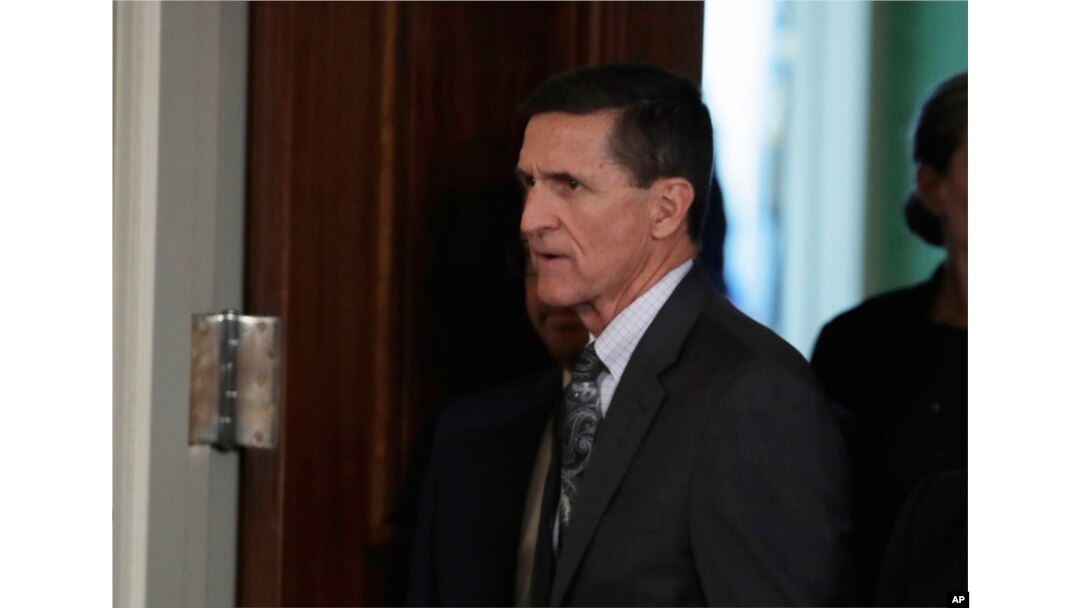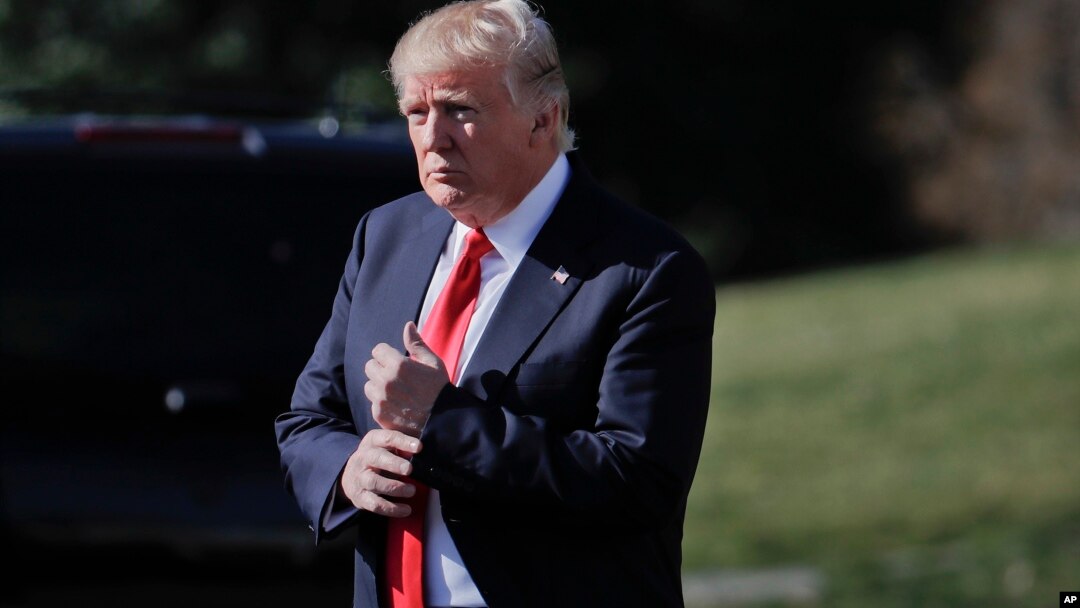President Donald Trump fueled the growing controversy surrounding Russia's alleged involvement in November's presidential election with attacks on NBC News and the network's political director, Chuck Todd.
In two Saturday morning tweets, Trump mocked Todd's appearance, criticized the network for not providing more coverage of unproven assertions that President Barack Obama wiretapped his campaign, and called on NBC to stop covering Russia's interference in the election.
The White House, meanwhile, sent mixed messages Friday about former national security adviser Michael Flynn's conditional offer to cooperate with congressional investigators looking into contacts between President Donald Trump's campaign advisers and Russia.

FILE - Michael Flynn, national security adviser at the time, is seen in the east Room of the White House in Washington, Feb. 13, 2017.
White House spokesman Sean Spicer told reporters at his daily media briefing he was "not going to give Mike Flynn or anybody legal advice from the podium" about whether he should testify before congressional committees if granted immunity from prosecution.
Spicer's remark was in contrast to a tweet earlier in the day from Trump that agreed Flynn should seek immunity for testifying in what he likened to politically motivated harassment campaigns.
Asked whether the White House was concerned Flynn had information that could be damaging to the Trump administration, Spicer tersely responded, "Nope."
News accounts circulated Thursday that Flynn was in talks with the House and Senate intelligence committees to try to get a promise of immunity, but that no one had agreed to his terms.
"General Flynn certainly has a story to tell, and he very much wants to tell it, should the circumstances permit,'' Flynn's attorney, Robert Kelner, said in a statement issued later Thursday.
Kelner added, "No reasonable person ... would submit to questioning in such a highly politicized, witch-hunt environment without assurances against unfair prosecution."
FILE - Rep. Adam Schiff, D-Calif., ranking member of the House Intelligence Committee, speaks to reporters on Capitol Hill in Washington, March 24, 2017.
'Grave and momentous step'
The highest-ranking Democrat on the House Intelligence Committee, Adam Schiff, issued a statement Friday describing Flynn's request for immunity as "a grave and momentous step" for a former senior administration official.
Schiff added it would be premature to grant Flynn's request. "There is still much work and many more witnesses and documents to obtain before any immunity request from any witness can be considered," he said.
Before granting immunity to Flynn, Schiff said, the committee would first need "a detailed proffer of any intended testimony."
Flynn, a retired lieutenant general, was forced to resign as one of Trump's closest advisers after it was revealed that he had misled Vice President Mike Pence about his communications with Russia's ambassador to the U.S., Sergey Kislyak.
The congressional committees are looking into whether any associates of Trump may have coordinated with agents of the Russian government seeking to meddle in last year's presidential election.
Clint Watts, right, a Senior Fellow at the Foreign Policy Research Institute Program on National Security, testifies before the Senate Intelligence Committee hearing on Capitol Hill in Washington, March 30, 2017, on Russian intelligence activities.
Disinformation campaign
Experts told the Senate Intelligence Committee on Thursday that Russia had pulled off an unprecedented and wildly successful campaign to influence America's political conversation during the election campaign.
"Russia hopes to win the second Cold War through the force of politics, as opposed to the politics of force," said cybersecurity expert Clinton Watts of the Foreign Policy Research Institute, a global policy research group in Philadelphia. Watts detailed Russia's use of cyberattacks and an elaborate disinformation campaign to confuse U.S. voters and pit Americans against each other.
The testimony confirmed what lawmakers of both parties have been saying for months. "Russian President Vladimir Putin ordered a deliberate campaign carefully constructed to undermine our election," said the committee's top Democrat, Senator Mark Warner of Virginia.
Russian President Vladimir Putin heads a Security Council meeting in Moscow, March 31, 2017.
Ahead of the open hearing, Putin blasted accusations of Russian electoral meddling as "provocations and lies." Asked on a television program whether Moscow had tried to influence the outcome of the U.S. presidential election, Putin said, "Read my lips: No."
Witnesses before the Intelligence Committee described voluminous and incontrovertible evidence to the contrary.
"We've got 10 years of observation here," said Kevin Mandia, chief executive officer of the U.S.-based cybersecurity firm FireEye. "It absolutely stretches credulity to think they [Russian actors] were not involved."
Republican Senator Marco Rubio of Florida shared an experience from his unsuccessful presidential bid last year.
"Former members of my presidential campaign team who had access to the internal information of my presidential campaign were targeted by the IP addresses with an unknown location within Russia. [The] effort was unsuccessful," Rubio said.
'Exceptional' efforts
"The [Russian] activities in the United States ... do seem to be exceptional," said Georgetown University security and intelligence expert Roy Godson, adding that cyber and disinformation campaigns allow Russian hackers to "hit above their weight" on the world stage.
Watts said Russia was aided last year by U.S. media outlets' extensive reports about material hacked by Russia that appeared on outlets like WikiLeaks, as well as occasions when the Trump campaign parroted disinformation that Moscow had disseminated about his opponent, Democrat Hillary Clinton. He added that Russia could one day turn its informational firepower against Trump.
Russia's action "is solely based on what they want to achieve ... whatever the Russian foreign policy objectives are," Watts said. "They will turn on President Trump, as well. They win because they play both sides."
Senate Intelligence Committee Chairman. Sen. Richard Burr, R-N.C., right, joined by Vice Chairman Sen. Mark Warner, D-Va., left, speaks at the Senate Intelligence Committee hearing on Capitol Hill in Washington, March 30, 2017.
'Following the money'
The hearing was the first of many the committee expects to hold in coming months — some open to the public, but many behind closed doors. Chairman Richard Burr, a North Carolina Republican, repeatedly has pledged an impartial and exhaustive search for the truth, and he has implored fellow committee members to refrain from partisan jabs.
"If we politicize this process, our efforts will likely fail," Burr said.
Warner echoed the call, saying the goal of the investigation was not to relitigate last year's election, but rather to hold Russia accountable.
But as one Democrat argued, if the committee is determined to bring to light any ties Trump's inner circle may have to Russia, the president himself must release his tax returns.
"They key to a successful investigation is following the money," said Senator Ron Wyden of Oregon. "Information about Donald Trump's finances may lead to Russia."
Trump has adamantly denied any links to Russia during or after the campaign, questioned U.S. intelligence about Russian meddling, and accused media outlets of mounting a smear campaign against him. Even so, the White House acknowledged the need for investigations to proceed.


